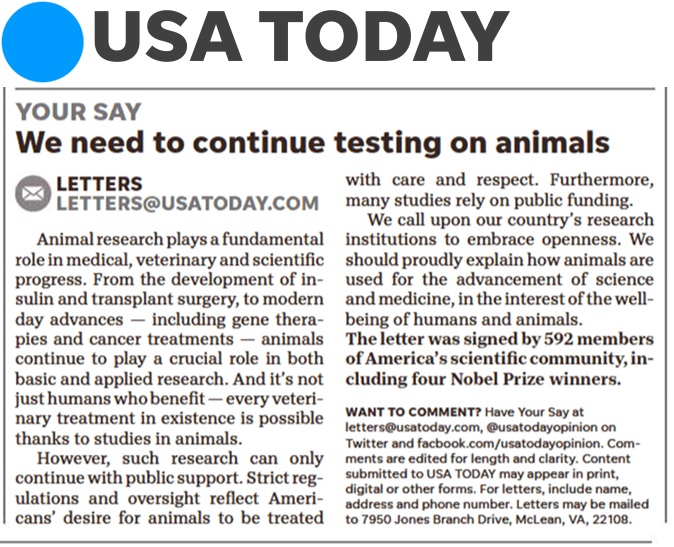The Pew Research Center’s poll of over 2,500 members of the public shows the continuation of a worrying trend in support for animal research in the U.S. Among adults, 52% of respondents said they “opposed the use of animals in scientific research”, with 47% in favour. This is slightly down from 2015 when only 50% opposed, and far down from 2009 when only 43% opposed (see tables below).
Digging deeper into the data, there is a clear gender divide, with men showing higher levels of support (NET +18) than women (NET -26). Support for animal research was also higher among those with higher levels of scientific knowledge.
This trend is also reflected in Gallup’s annual polling, which shows the number of people who believe that “medical testing on animals is morally acceptable” has dropped from 65% (NET +40) to 54% (NET +11), even after a slight uptick in the 2018 survey. If the downward trend continues, it would infer that those believing animal research was morally unacceptable would overtake those who felt it was acceptable in around six years.
Speaking about this intersection between “morally acceptable” and “morally unacceptable”, Ken Gordon, Executive Director of the Northwest Association for Biomedical Research, told Science Magazine:
When that happened with gay marriage and marijuana legalization, the law changed. If we keep being secretive about animal research, our laws are going to change, too. Funding will dry up, and our work will get a lot more difficult.
Faced with a drop in public support in the UK, from 76% to 66% in 2012 (“I can accept animal experimentation so long as there is no unnecessary suffering to the animals” – Ipsos Mori), the UK embarked on a campaign of openness encapsulated by the Concordat On Openness, which was very likely to have been instrumental in bringing support back up to 71% by 2016. It is expected that new polling for 2018 will be released in the near future.
Speaking of Research continues to believe that openness is the way to tackle declining public support. As the Pew data demonstrates, increased education about science closely correlates with higher support for animal research. Earlier this year, almost 600 scientists, including four Nobel Prize winners wrote to USA Today, in a campaign led by Speaking of Research, demanding institutions work towards greater openness in the sector.
As the letter says, animal research can only continue with public support, and we join the call of scientists that our country’s research institutions embrace openness and proudly explain how animals used for the advancement of science and medicine.
Speaking of Research




This is very skewed research. Is this study using the USDA definition of animal where it excludes mice and rats? The author of “some we love, some we hate, some we eat” brought up this issue. According to his research, most people are all about animal research on mice. But asking the general public about animal research, most people think of animal research as research on dogs and monkeys. When I tell people I work in a lab, they tentatively ask me…. er.. what kind of animals do you work with. When I say mice, they visibly relax. Like “phew, I am not speaking to a murderer!” This article is just fear mongering. You are using skewed data just like animal rights groups do.
The polling questions both use the word “animal” – they do not define what animal means (this lack of definition is very normal in polling).
You are absolutely right to note that people have a mistaken idea of what species are used in research. You are also right to note that public acceptance of mouse and fish research is higher than for dogs and monkeys. However, naming the species has a tendency to lower acceptability compared with “animal” (see the UK polling for evidence: https://www.ipsos.com/ipsos-mori/en-uk/attitudes-animal-research-2016)
We are giving the raw data – we are not hiding any other data. It’s polling data from two respected pollsters.
Yes I know they do not define “animal” that is the whole point of my comment (rolls eyes)
I’m reminded of an observation by playwright George Bernard Shaw: “Anyone who doesn’t hesitate to vivisect, will not hesitate to lie about it.”
asking the wrong question.. better to ask “If you were told you or your loved one had a disease that could be cured through animal research would you support it and use the medical cure or deny the cure for your self or your loved one?” I would bet that most would answer .. yes I would use it..